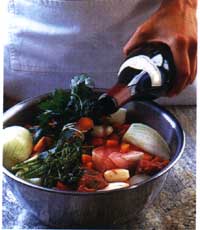|
.... to combine food, usually meat or seafood, and occasionally vegetables
with aromatic ingredients in order to flavor the food. Most marinades are
based on flavorful liquids such as wine, soy sauce or lemon juice and
flavored with herbs such as thyme or rosemary and aromatic vegetables such
as onions and garlic. Foods are usually allowed to stand in the marinade
for a period of time before cooking so that the flavors can penetrate the
food.
Marinades are often used in the preparation of meat or poultry stews. For
some stews, the marinade is strained before cooking, the aromatic
vegetables browned like the meat, and the marinade liquid is usually wine
is used as all or part of the stewing liquid. For other stews, the
marinade, vegetables and all, is simply added to the meat, without
browning the vegetables. Some marinades, especially those for
quick-cooking meat, poultry or seafood stews, are cooked and allowed to
cool before they are used.
This allow the aromatic vegetables to release their flavor into the wine,
and also cooks off some of the aggressive raw acidity of the wine.
Marinades for seafood often contain lemon juice but is not recommended
because it can cause the food to stick to the grill or pan. Delicate
seafood rarely requires a marinade, which could interfere with its flavor,
but for grilling, a simple mixture of extra virgin olive oil and a chopped
fresh herb, tossed with the seafood or brushed on before grilling, is
best.
Dry marinades, called rubs, are also sometimes used for meat, seafood and
vegetables. Rubs can be made with finely chopped dried or fresh herbs,
ground spices, or ground dried mushrooms. Rubs are usually left on the
meat or seafood during the cooking.
Occasionally, marinades are added to foods after the foods are cooked. The
marinade is made by cooking aromatic vegetables which varies, but most
recipes include at least garlic and onions, in olive oil, then adding wine
or vinegar. The marinade is cooled and poured over the sautéed seafood.
|

